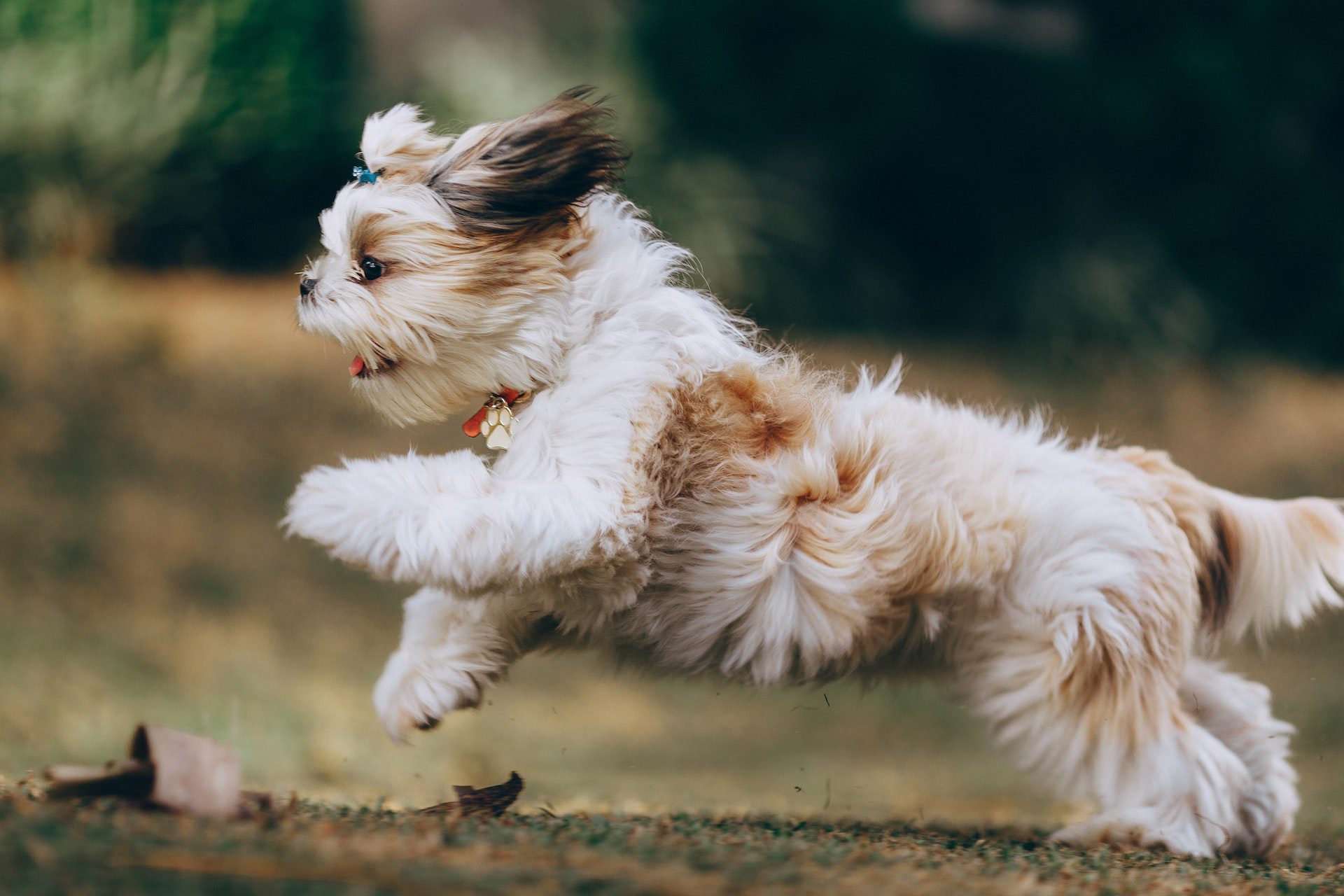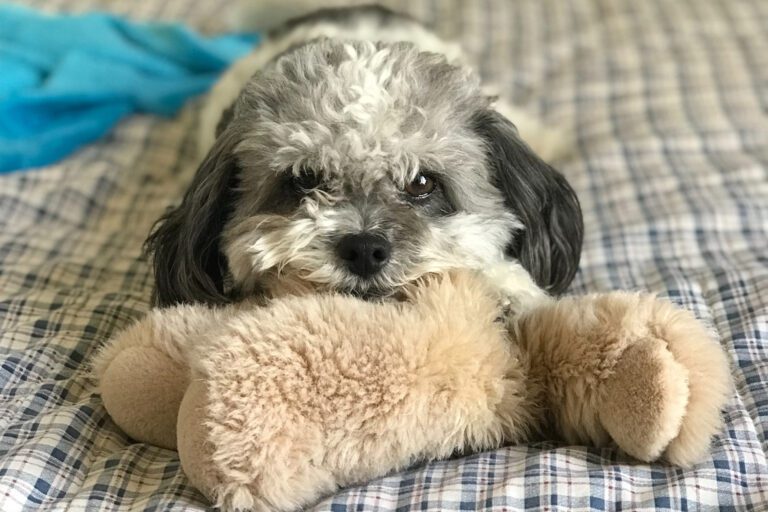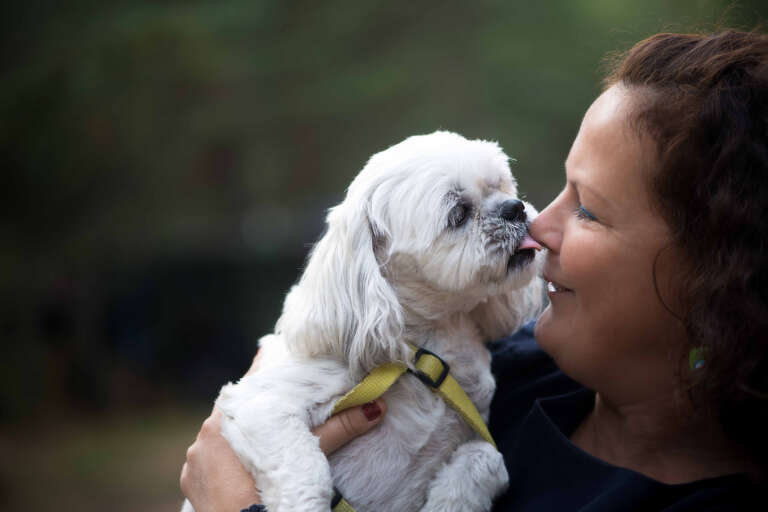20 Shih Tzu Behavior Problems: How To Discipline Them?
Did you know that 17.5% of dogs exhibit some behavioral problem caused by anxiety during their lifetime? If your Shih Tzu is one of them, it can be frustrating and confusing to figure out how to discipline him.
Some common Shih Tzu behavior problems include barking excessively, biting, chewing, jumping, pulling on the leash, and disobedience. These behaviors can be annoying or even dangerous, so addressing them is essential to maintain a happy and healthy relationship with your Shih Tzu.
This article will discuss 20 common Shih Tzu behavior issues and provide tips on disciplining them. It’s important to remember that every Shih Tzu is unique and may require a different approach to training.
Shih Tzu Behavior Problems
Here are 20 common Shih Tzu behavior problems:
1) Disobedience or Stubbornness
Shih Tzus are notoriously independent-minded dogs and often prefer doing things their way. It can make them seem disobedient or stubborn when they refuse to follow commands or respond to training.
However, most Shih Tzus can be taught to mind their manners with patience and consistency. The key is to avoid getting frustrated or angry – instead, remain calm and firm, and keep rewarding your Shih Tzu for good behavior. You should train your Shih Tzu to mind his manners with time and patience.
2) Excessive barking or whining
One common Shih Tzu behavior problem is excessive barking or whining. Several things, including boredom, fear, anxiety, or Separation Anxiety Disorder, can cause it. Suppose your Shih Tzu is exhibiting this behavior. In that case, it is essential to consult with a veterinarian or animal behaviorist to rule out any medical causes and to develop a plan to address the behavioral issue.
3) Jumping up on people or furniture
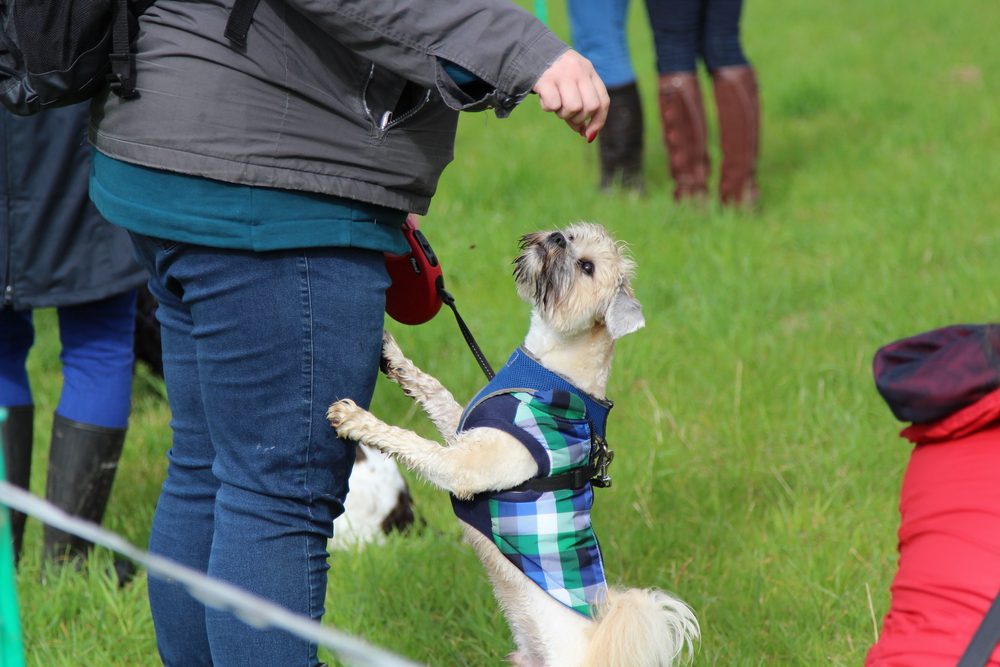
Shih Tzu jumping up on people or furniture is a common behavioral problem. There are a few possible reasons for this behavior. One reason may be that the Shih Tzu is seeking attention. Shih Tzus are known for being very affectionate and loving animals, and they may jump up to get closer to their owner.
Another possibility is that the Shih Tzu is excited or anxious and is Jumping up to release that energy. Shih Tzus are also known to be very playful animals, so this may be another factor contributing to the problem behavior.
Regardless, Shih Tzu jumping up can be problematic and should be addressed. There are a few different ways to do this:
-
Ignore the behavior altogether by not giving the Shih Tzu any attention, whether it be positive or negative when it jumps up.
-
Provide positive reinforcement when the Shih Tzu does not jump up. This could include treats, petting, or verbal praise.
4) Chasing cars or other animals
Shih Tzu behavioral problems can include many issues, but one common problem is chasing cars or other animals. It can be a dangerous behavior, leading to your Shih Tzu getting hit by a car.
Additionally, it can be frustrating for you as the owner, as you constantly have to chase after your dog.
There are a few different ways to address this behavior:
-
Make sure that your Shih Tzu is getting enough exercise. A tired dog is less likely to be chasing cars.
-
Redirect your dog’s attention when he or she starts to chase after a car. For example, you can offer a treat or toy as a distraction.
5) Begging for food or treats
This dog breed is notoriously food-motivated, and many Shih Tzus will beg relentlessly for any scrap of food they can get their paws on.
While it may be cute to see your Shih Tzu begging at the dinner table, this behavior can quickly become annoying (and even dangerous if your dog tries to snatch food off of plates or countertops).
The best way to curb this behavior is to never give in to your dog’s begging. That means no giving him table scraps, no sneaking him bites of your food, and no special treats just for being cute.
If you are consistent with this rule, your Shih Tzu will eventually learn that begging is not an effective way to get what he wants.
6) Stealing food or objects

Shih Tzus can be prone to some behavioral issues, one of which is stealing food or objects. In some cases, Shih Tzus may steal out of boredom or in an attempt to get attention. Additionally, Shih Tzus may develop a habit of stealing if they are not adequately trained or socialized from a young age.
If your Shih Tzu is exhibiting this behavior, seeking professional help from a certified animal behaviorist is vital.
7) Separation anxiety
Shih Tzu behavior problems are often the result of separation anxiety. When a Shih Tzu has left alone, he may become anxious and restless, pace back and forth, or bark excessively. He may also try to escape from his home or yard to find his owner. It can lead to destructive behaviors such as chewing on furniture or chewing on himself.
Separation anxiety is often the result of a lack of socialization. Shih Tzus, who have not been adequately socialized, may become anxious when they are away from their owner. They have yet to trust that their owner will always return. Proper socialization can help prevent separation anxiety and other behavior problems.
8) Destructive chewing or scratching behavior
Anxiety can also trigger chewing and scratching behaviors. Shih Tzu who are anxious may pace or pant excessively and may also start chewing on themselves or objects in their environment. If left unchecked, these problem behaviors can damage your home and belongings severely.
Fortunately, there are several things you can do to prevent or stop these behaviors. Providing your Shih Tzu with plenty of toys and other forms of mental stimulation will help to keep them from becoming bored. If your Shih Tzu is anxious, try using a calming supplement or pheromone spray to help reduce their anxiety levels.
9) House-soiling (peeing and pooping in the wrong places)
Shih Tzus are generally clean dogs that have few problems with house soiling. However, some Shih Tzus develop behavioral issues that cause them to urinate or defecate in the wrong places. This behavior has several possible causes, including anxiety, boredom, excitement, fear, and medical conditions.
If your Shih Tzu has accidents in the house, it is essential to consult your veterinarian to rule out any medical causes. Suppose a medical condition is not to blame. In that case, you will need to work with a certified animal behaviorist to identify the root cause of the problem and develop a customized plan to help your Shih Tzu learn to make appropriate choices.
10) Excessive licking or grooming behavior
Excessive licking and grooming can also indicate food allergies or sensitivities. If your Shih Tzu licks and grooms excessively, it’s essential to consult with your veterinarian to rule out any medical conditions. If a medical condition is ruled out, you can work on addressing the underlying behavioral issue.
Shih Tzu that lick and groom excessively often do so out of boredom or anxiety. You’ll need to provide your Shih Tzu with more mental stimulation and exercise to address these issues. You may also need to feed a higher-quality diet and provide more opportunities for positive reinforcement.
11) Hyperactivity and constant energy
Shih Tzus are small dogs with a lot of energy and can be pretty hyperactive. If they don’t exercise enough, this excess energy can manifest in various behavioral problems, such as barking, chewing, and digging. Fortunately, proper training and exercise can remedy Shih Tzu behavior problems. By giving your Shih Tzu the attention and exercise he needs, you can help him stay happy and well-behaved.
12) Fearfulness and shyness around strangers
Behavior problems in Shih Tzus around strangers are usually caused by one of two things; lack of socialization or genetics.
-
Lack of socialization occurs when a Shih Tzu isn’t exposed to enough different people, places, and situations during the critical socialization period between 8 and 16 weeks of age. As a result, they can be fearful or shy when they encounter unfamiliar people or situations later in life.
-
Genetics can also play a role in Shih Tzu’s behavioral problems. Some Shih Tzus are simply born more timid and introverted than others, and this temperament is often passed down from generation to generation.
However, even Shih Tzus with timid dispositions can be socialized to be confident and outgoing if they’re given plenty of exposure to new people and experiences during puppyhood.
13) Aggression towards people, other animals, or objects
Many Shih Tzu owners find that their dogs may exhibit aggressive behavior at some point. While aggression is a normal part of canine behavior, it can be problematic if directed toward people, other animals, or objects.
Several possible causes of Shih Tzu aggression include fear, insecurity, and jealousy. In some cases, aggression may also be caused by medical conditions or medications. If you are concerned about Shih Tzu’s aggressive behavior, you must talk to your veterinarian or a qualified animal behaviorist. With their help, you can identify the cause of the problem and develop a plan to address it.
14) Submissive urination (urinating when greeting someone new)
Submissive urination – when a dog urinates when meeting someone new, or when they feel threatened or scared. Although it is more common in puppies, some adult dogs may also do it. There are a few things that can cause submissive urination, including:
-
timid or shy personality
-
lack of socialization
-
fear or anxiety
-
stress
-
excitement
Submissive urination is usually not a serious problem, but it can be annoying and embarrassing. If you’re Shih Tzu is having this problem, there are a few things you can do to help them feel more comfortable around people:
-
introduce them to new people gradually
-
provide positive reinforcement when they behave well around new people (treats, verbal praise, etc.)
-
avoid punishing them for accidents – this will only make them more anxious and less likely to want to use the restroom in front of people.
15) Reluctance to potty train
Unfortunately, many Shih Tzu owners are reluctant to potty train their dogs, thinking it will be too difficult or time-consuming. However, the reality is that potty training is an essential part of owning a Shih Tzu. Without proper training, Shih Tzus are prone to accidents in the house, which can lead to behavioral problems.
In addition, Shih Tzus, who are not properly trained, are more likely to develop health problems, such as urinary tract infections. As a result, it is essential to start potty training as soon as possible.
16) Digging

Shih Tzu digging problems are usually the result of boredom, fear, or separation anxiety. If your Shih Tzu has developed a digging habit, it’s crucial to figure out the underlying cause so that you can address the issue.
Whatever the cause of your Shih Tzu’s digging habit, some solutions can help. By taking the time to understand your dog’s needs, you can correct the problem and keep your furry friend happy and healthy.
17) Picky Eating
Any Shih Tzu owner knows that these dogs can be picky eaters. Shih Tzus often develop behavioral problems around food, which can be frustrating for the dog and the owner. There are a few reasons why Shih Tzus may become picky eaters:
-
Shih Tzus are bred to be lap dogs, and they often think of food as a reward for being good. As a result, Shih Tzus may become picky eaters if they feel that they are not being rewarded for their behavior.
-
Shih Tzus have a strong sense of smell, and they may be turned off by strong odors. If the food is not fresh or if it has been sitting out for too long, the Shih Tzu may refuse to eat it.
-
Shih Tzus are sensitive to changes in their environment, and they may become picky eaters if they are nervous or anxious. If the Shih Tzu is feeling stressed, he may simply lose his appetite.
By understanding the reasons behind picky eating, owners can help their Shih Tzus develop healthy eating habits.
18) Biting
Shih Tzu behavioral problems can include various issues, such as biting. this behavior can be caused by a number of things, including teething, fear, or boredom.
-
If your Shih Tzu is biting, it’s important to try to figure out the root cause of the behavior.
-
If the biting is due to teething, you can provide your dog with chew toys or treats that will help ease the pain.
-
If the biting is due to fear or anxiety, you’ll need to work with a trainer to help your dog feel more comfortable around people and other dogs.
-
If the biting is due to boredom, you’ll need to provide your dog with more exercise and stimulation. Shih Tzus are active dogs that need plenty of mental and physical activity.
19) Eating their own poop
One of the most common Shih Tzu behavior problems is eating poop. While this may seem gross to us, it’s quite normal for dogs to consume feces. For Shih Tzus, this behavior may be due to a lack of nutrients in their diet or anxiety. Sometimes, it may also be a sign of an underlying health condition.
If your Shih Tzu is exhibiting this behavior, it’s essential to consult your veterinarian to rule out any medical causes and develop a plan to address the problem.
20) Humping
Humping is usually a sign of dominance or excitement and can be directed at both people and other animals. In some cases, humping may also be a form of attention-seeking behavior. Shih Tzus, who hump excessively, may benefit from obedience training, as this can help to teach them appropriate ways to express their excitement or dominance.
Additionally, Shih Tzus, who humps out of attention-seeking behavior, may need more mental and physical stimulation, such as interactive toys and daily walks or runs. By understanding the causes of humping behavior in Shih Tzus, owners can take steps to prevent or reduce this behavior.
How to Discipline your Shih Tzu with Behavioral Problems?
Here are some tips on how to discipline your Shih Tzu with behavioral problems:
1. Understand what is causing the behavioral problems
The first step in addressing your Shih Tzu’s behavioral problems is understanding what is causing them. Many possible causes of these problems include boredom, fear, anxiety, and stress. If you can identify the root cause of your dog’s problem behavior, you will be better able to address it.
2. Ignore the bad behavior and praise the good behavior
One of the simplest and most effective ways to discipline your Shih Tzu is to ignore the bad behavior and praise the good behavior. It means that you should not give your dog attention when he is engaging in undesirable behavior, such as barking or chewing on furniture. Instead, it would help if you waited until he behaved nicely and gave him lots of praise and attention.
3. Use positive reinforcement to encourage good behavior
Positive reinforcement is a powerful tool that can be used to encourage desirable behavior in dogs. When your Shih Tzu exhibits a behavior you want to promote, such as sitting calmly or walking nicely on a leash, you should immediately reward him with a treat or verbal praise. It will let him know he is doing something right and help reinforce the desired behavior.
4. Use negative reinforcement to discourage bad behavior
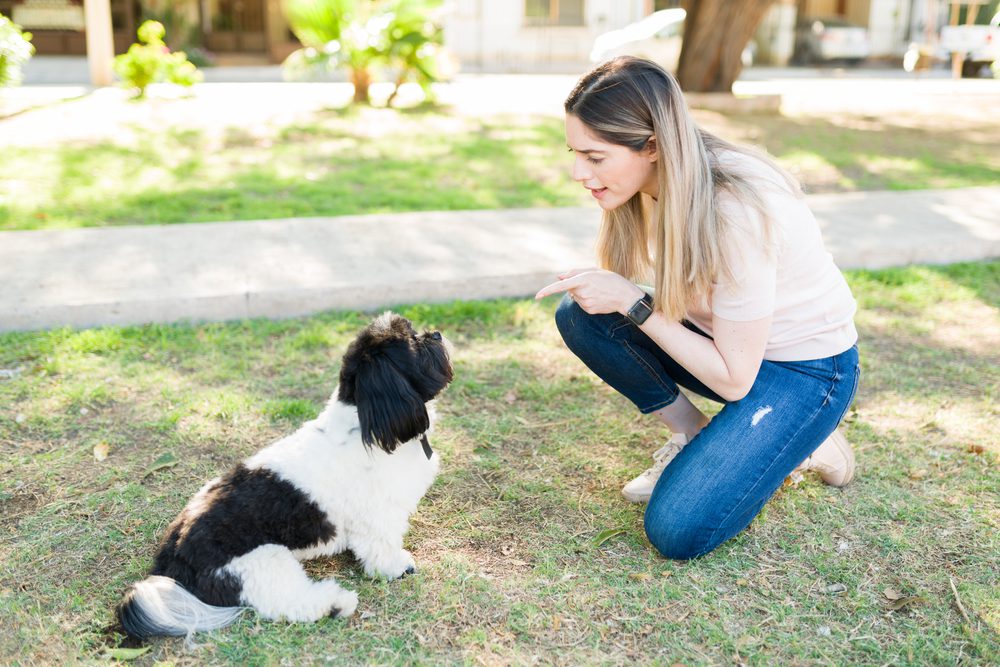
Although many behaviorists do not recommend it, negative reinforcement can also help discipline your Shih Tzu if positive reinforcement is not working. It involves giving your dog an unpleasant consequence when he engages in undesirable behavior, such as scolding or spraying him with water. The goal is to make the lousy behavior less enjoyable for your dog so that he is less likely to do it in the future.
5. Be consistent with your discipline
It is important to be consistent with your discipline for it to be effective. It means you should always respond the same way whenever your Shih Tzu exhibits a particular behavior. For example, if you scold him for jumping on people, you should always scold him whenever he does it. Consistency will help your dog understand what behaviors are acceptable and which ones are not.
Conclusion
Disciplining your Shih Tzu is essential to prevent behavioral problems from developing or worsening. If you think your dog may have a behavioral problem, the first step is to consult with a professional trainer or behaviorist. They will be able to help you come up with a specific plan for addressing your dog’s needs. Remember, every dog is different, and what works for one may not work for another. Be patient, consistent, and firm when disciplining your Shih Tzu, and always make sure to end positively. Do you have experience dealing with behavioral problems in Shih Tzus? What tips would you add? Comment and share below!
FAQs
What is the common behavior of Shih Tzu?
Shih Tzu are small, playful, and affectionate dogs. They are known for their loyalty and tendency to form strong bonds with their owners. They are generally good with children and other pets and can adapt well to apartment living as long as they get daily exercise.
How do you know if your Shih Tzu has behavioral problems?
Shih Tzus who are experiencing behavioral problems may start to exhibit aggression, destructiveness, or separation anxiety. They may also begin to bark excessively or show signs of fearfulness or insecurity. If you notice any of these changes in your Shih Tzu’s behavior, it’s important to consult with a veterinarian or canine behaviorist as soon as possible. With early intervention and the help of a professional, you can often successfully resolve any behavioral problems your Shih Tzu is experiencing.
How do you discipline a Shih Tzu?
Disciplining a Shih Tzu should be done with positive reinforcement and consistency. Using rewards for good behavior, such as treats and praise, can be effective in shaping desired behavior. Avoid physical punishment or yelling, as this can damage the trust and bond between you and your dog. It’s important to set clear rules and consistently enforce them in a calm and firm manner.
How do you deal with a stubborn Shih Tzu?
If your Shih Tzu is particularly stubborn, it’s important to be consistent and firm in your training. It may also be helpful to enroll in an obedience training class to learn how to effectively communicate with your dog.
Why is my Shih Tzu not affectionate?
There could be a variety of reasons why your Shih Tzu is not affectionate. It could be due to a lack of socialization, past trauma or abuse, or simply the dog’s individual personality. It’s also possible that your dog is experiencing health issues that are causing a lack of affection. If you’re concerned about your Shih Tzu’s lack of affection, it’s a good idea to consult with a veterinarian to rule out any potential health issues.

